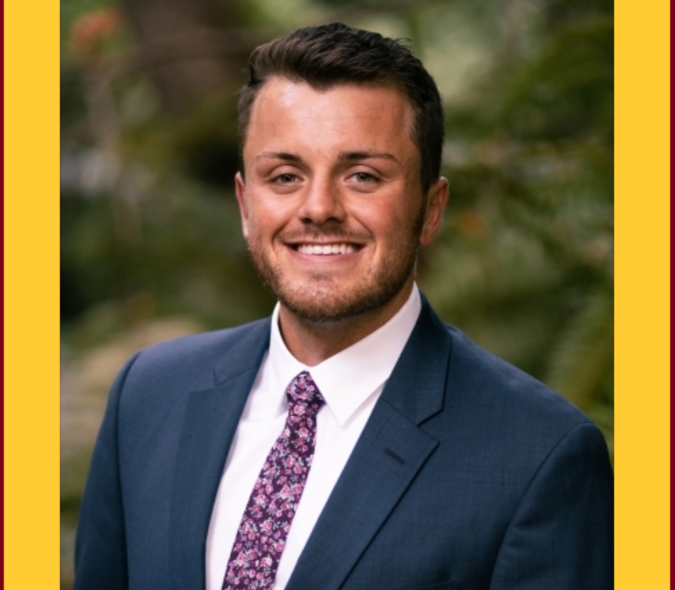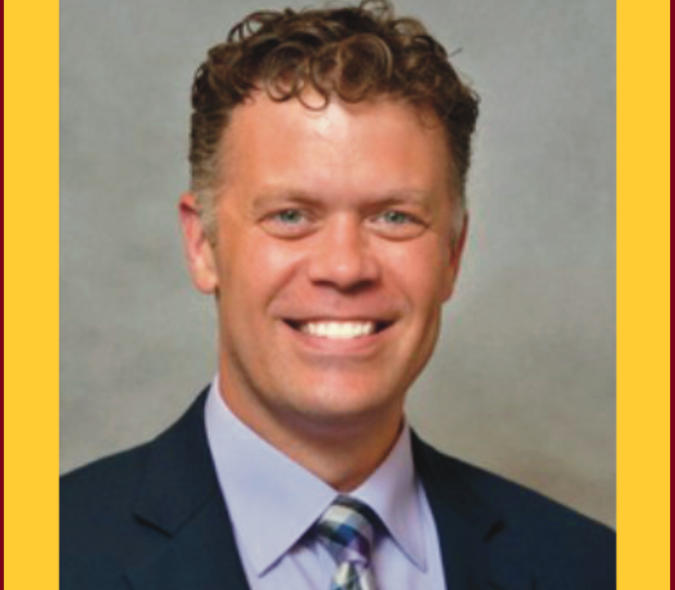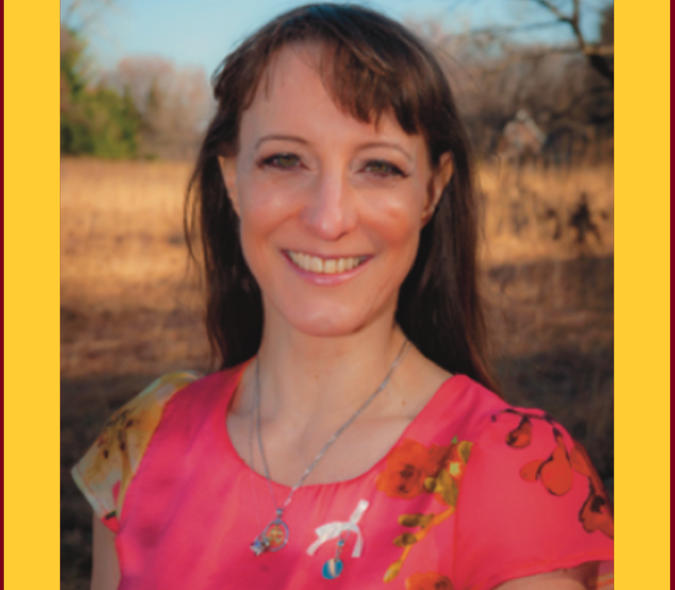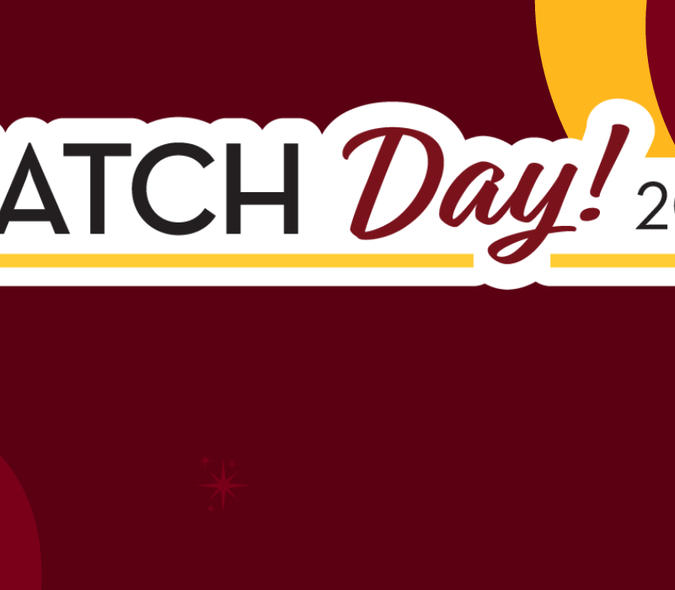
First-Year Primary Care Behavioral Health Fellow Shares their Journey from the Military to Psychology
Ehren Emter, PsyD, is a Primary Care Behavioral Health fellow at the DFMCH, splitting their time between M Health Fairview Clinic - Smiley's in Minneapolis and M Health Fairview Clinic - Bethesda in St. Paul. The following is an interview with Dr. Emter about their path to becoming a clinical health psychologist.
A nontraditional route to becoming a psychologist
When I originally started out, I joined the Army when I turned 17. I had a couple of different jobs there. One of them was a clerk at one of the US Army Reserve Hospitals in Helena, Montana. One of the things I really enjoyed was speaking with everyone. Oftentimes I'd be the first person in uniform that the reservists would see after they got back from a deployment or something like that and were reintegrating into the reserve unit.
After that, I sought some additional training and decided to become a suicide interventionist. Then I was a sexual assault response and prevention officer, and I also did some career counseling. I really liked working with people.
At that point, I decided to go to college with the goal to get promoted. I started out studying business, but I realized quickly that I hated anything to do with accounting and finance. So I transferred to organizational management and received my undergraduate degree. I enjoyed the people management piece of that program.
Discovering health psychology
Following a year off after college, I had the opportunity to work with the comprehensive soldier fitness program, which is the Army's equivalent of a wellness initiative. It was birthed out of the University of Pennsylvania's positive psychology program. That was actually the first time I realized that a psychologist could do something other than work in an inpatient psychiatric hospital, and I began looking for a school. I realized that I was soon going to deploy, so I switched to an online master's degree program in psychology focusing on career management and counseling.
While I was overseas, I was again drawn to talking with people. I realized that I didn't want to hand my clients off anymore. I was tired of that transition or interventionist role. So that's when I remembered that being a psychologist is not that caricature I once imagined of being in a psych ward or something like that. I sought out different programs and got my doctor of psychology in counseling psychology from Chatham University of Pittsburgh.
I was drawn to that program because they talked about sustainable wellness and how the environment helps to shape our wellness. It was a great fit with my philosophy. As part of my practicum experiences there, I worked in internal medicine and an inpatient cancer ward, and served as a hospital-wide consultation liaison. I was also in a pediatric and young adult medicine clinic specializing in gender and sexual orientation development. I really liked working with the medical profession and doing health psychology.
I completed my internship in clinical health psychology in Dayton, Ohio, at the VA Medical Center. I worked in primary care mental health integration and with the inpatient substance use program. When the opportunity came to become a primary care behavioral health fellow at the University of Minnesota, I decided to pursue it because it integrated another one of my passions, which is teaching and training.
A day in the life of a primary care behavioral health fellow
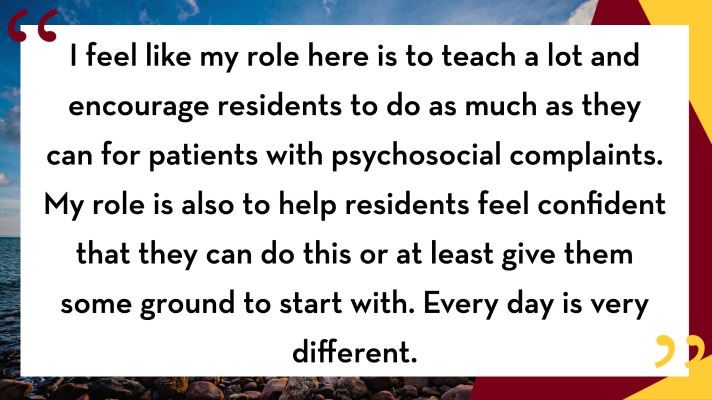
My most regular and consistent days are my Tuesdays and Wednesdays when I do traditional therapy at Bethesda and Smiley's. Other than that, it's very different day to day.
For example, when I'm the behavioral health preceptor, whatever comes into the room is what I'm dealing with. Sometimes that looks like shadowing residents and providing feedback on a patient-centered observation form. Sometimes residents come to consult with me. I was talking to a resident recently about a patient who was coming in for anxiety, and I offered guidance on how he might think about observing or assessing the patient's anxiety further.
I feel like my role here is to teach a lot and encourage residents to do as much as they can for patients with psychosocial complaints. My role is also to help residents feel confident that they can do this or at least give them some ground to start with.
We also teach by observation. Especially with the first-year residents, I might come in and take over an assessment for suicidality or different mental health issues, and they'll watch me. Sometimes we have patients who are acutely suicidal or have psychosis or there's a substance component or there are family dynamics to deal with. I can help at any part of that appointment from taking over the assessment to working alongside the resident who is managing the situation. Every day is very different.
Fostering a love of teaching
My favorite part of this fellowship is definitely the teaching piece. I really like helping physicians in training improve their own practice or feel better about their care. That is something very powerful and gratifying. Every time I talk with a resident about how they feel more comfortable in the room assessing a different diagnosis, I think about all the patients that they're going to help. And I think about how the residents are going to have better mental health themselves.
I also really appreciate the personal relationships that we develop with the learners and helping them feel confident. I think it's really neat every time I get a chance to do it.
Looking beyond the behavioral health fellowship
I definitely see myself working in a similar environment after this fellowship. I'm really interested in working with pain and substance use in particular within family medicine. My goal would be doing something very similar to what I'm doing now or being a director of behavioral health in family medicine, and incorporate classroom teaching as well.
Guidance for those who may need support
As I look at my experience so far and being a psychologist, one of the most important things is connection. Any connection is helpful. These days, sometimes we even miss talking to the person at the checkout counter, at the restaurant, just those everyday pieces of connection. For me, personally, the most important part has been connecting to the residents and seeing the residents connecting to each other.
Right now, and always, it is so important for helpers to take care of themselves. Oftentimes we're givers by nature. But when it comes to taking care of ourselves, we're terrible at it. My dissertation actually studied wellness and medical professionals, and there's so much burnout that is happening. I collected data at the beginning of the pandemic, just coincidentally, and there were a lot of reports of disconnection from people and people feeling worn out.
I would encourage everyone to seek connection when they need it, whether that is from someone like myself or simply being in a room with other people with your headphones on and reading a book.
Connection is everything.
